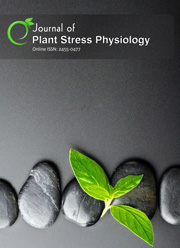Phenotyping of mungbean (Vigna radiata L.) genotypes against salt stress and assessment of variability for yield and yield attributing traits
DOI:
https://doi.org/10.25081/jpsp.2020.v6.6111Keywords:
salt stress, mungbean, reproductive phase, salt tolerance indices, trait relationshipAbstract
Salt tolerance is a complex polygenic trait that is genotype specific and tolerance can depend upon a plants developmental stage. To evaluate reproductive stage specific salt tolerance as well as investigate the inherent variability of mungbean (Vigna radiata L.) genotypes with respect to seed yields and yield-related traits, a pot culture experiment was conducted using 26 mungbean genotypes and exposure to salt stress (EC = 8.0 dS/m) applied at the reproductive stage, just before the opening of the first flowers. The experiment involved maintaining 100% field capacity for three weeks and used a randomized complete block design with three replicates. Data were collected, included days to maturity, plant height (cm), number of pod-bearing branches per plant, number of pods per plant, pod length (cm), number of seeds per pod, 100-seed weight (g) and seed yield per plant (g). Salt stress led to a significant (p<0.001) decrease in seed yield per plant, with yields of the genotypes BMX 11116, BMX 11176, BMX 11140, BMX 11111 and BMX 11163 being the least impacted by exposure to salt. Principal component analysis revealed that the first two components explained 63.5% of the total variation among the mungbean genotypes. Seed yield per plant showed a significant positive correlation with days to maturity, number of pod-bearing branches per plant, number of pods per plant, pod length (cm), number of seeds per pod, and 100-seed weight (g). Cluster analysis grouped the 26 genotypes into five distinct clusters, where the tolerant genotypes placed in cluster I. Based on their stress tolerance indices BARI Mung-6, BMX 11176, BMX 11116, and BMX 11140 were categorized as tolerant genotypes, were selected for further study under direct field conditions and are recommended for the genetic improvement of salt stress tolerance in mungbean.



 .
.